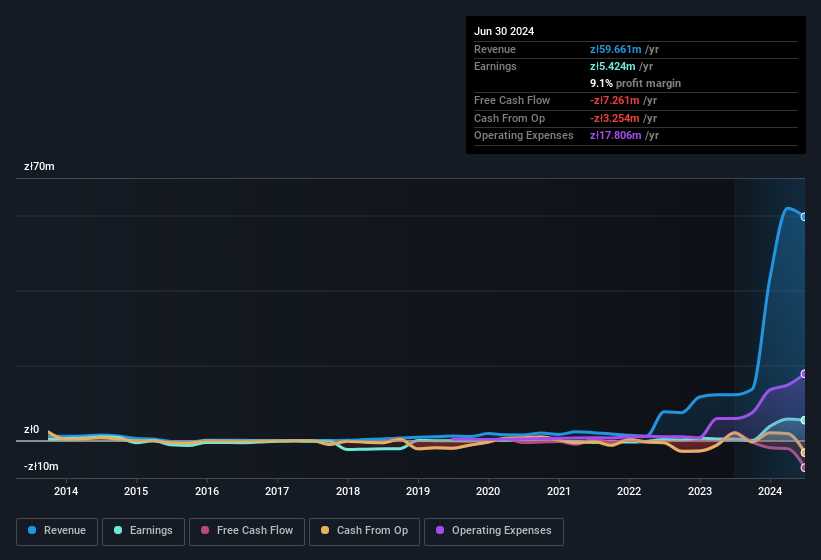Fintech S.A.’s (WSE:FTH) stock was strong after they recently reported robust earnings. However, our analysis suggests that shareholders may be missing some factors that indicate the earnings result was not as good as it looked.
Check out our latest analysis for Fintech

Examining Cashflow Against Fintech’s Earnings
As finance nerds would already know, the accrual ratio from cashflow is a key measure for assessing how well a company’s free cash flow (FCF) matches its profit. In plain english, this ratio subtracts FCF from net profit, and divides that number by the company’s average operating assets over that period. You could think of the accrual ratio from cashflow as the ‘non-FCF profit ratio’.
Therefore, it’s actually considered a good thing when a company has a negative accrual ratio, but a bad thing if its accrual ratio is positive. While having an accrual ratio above zero is of little concern, we do think it’s worth noting when a company has a relatively high accrual ratio. To quote a 2014 paper by Lewellen and Resutek, “firms with higher accruals tend to be less profitable in the future”.
For the year to June 2024, Fintech had an accrual ratio of 1.47. Statistically speaking, that’s a real negative for future earnings. To wit, the company did not generate one whit of free cashflow in that time. In the last twelve months it actually had negative free cash flow, with an outflow of zł7.3m despite its profit of zł5.42m, mentioned above. It’s worth noting that Fintech generated positive FCF of zł2.1m a year ago, so at least they’ve done it in the past. The good news for shareholders is that Fintech’s accrual ratio was much better last year, so this year’s poor reading might simply be a case of a short term mismatch between profit and FCF. Shareholders should look for improved cashflow relative to profit in the current year, if that is indeed the case.
Note: we always recommend investors check balance sheet strength. Click here to be taken to our balance sheet analysis of Fintech.
Our Take On Fintech’s Profit Performance
As we have made quite clear, we’re a bit worried that Fintech didn’t back up the last year’s profit with free cashflow. As a result, we think it may well be the case that Fintech’s underlying earnings power is lower than its statutory profit. The silver lining is that its EPS growth over the last year has been really wonderful, even if it’s not a perfect measure. The goal of this article has been to assess how well we can rely on the statutory earnings to reflect the company’s potential, but there is plenty more to consider. So while earnings quality is important, it’s equally important to consider the risks facing Fintech at this point in time. Case in point: We’ve spotted 3 warning signs for Fintech you should be mindful of and 2 of these don’t sit too well with us.
This note has only looked at a single factor that sheds light on the nature of Fintech’s profit. But there are plenty of other ways to inform your opinion of a company. Some people consider a high return on equity to be a good sign of a quality business. So you may wish to see this free collection of companies boasting high return on equity, or this list of stocks with high insider ownership.
New: AI Stock Screener & Alerts
Our new AI Stock Screener scans the market every day to uncover opportunities.
• Dividend Powerhouses (3%+ Yield)
• Undervalued Small Caps with Insider Buying
• High growth Tech and AI Companies
Or build your own from over 50 metrics.
Have feedback on this article? Concerned about the content? Get in touch with us directly. Alternatively, email editorial-team (at) simplywallst.com.
This article by Simply Wall St is general in nature. We provide commentary based on historical data and analyst forecasts only using an unbiased methodology and our articles are not intended to be financial advice. It does not constitute a recommendation to buy or sell any stock, and does not take account of your objectives, or your financial situation. We aim to bring you long-term focused analysis driven by fundamental data. Note that our analysis may not factor in the latest price-sensitive company announcements or qualitative material. Simply Wall St has no position in any stocks mentioned.

